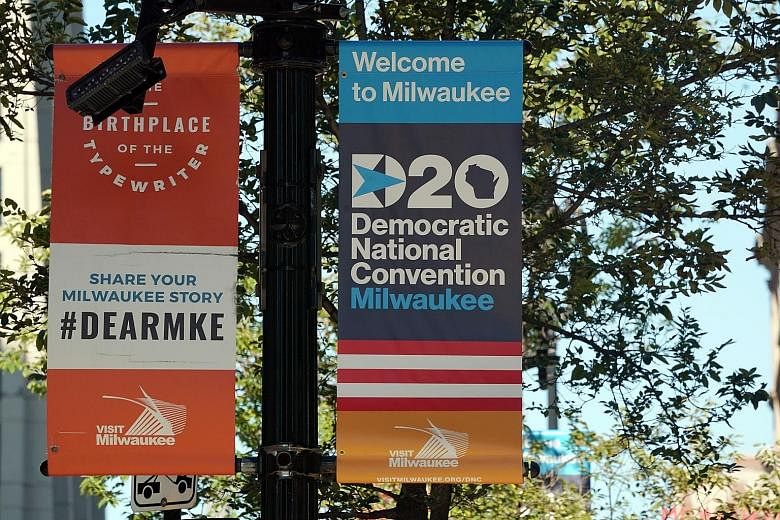In ordinary times, tens of thousands of political delegates and journalists would by now be streaming into Milwaukee, Wisconsin, for the Democratic National Convention (DNC), which will take place from today to Thursday.
But this year's party conventions, including the Republican National Convention (RNC) in Charlotte, North Carolina, next week, will be much smaller affairs, with fewer in-person attendees to comply with social distancing restrictions. Instead of big, arena-based rallies with thousands of people cheering and waving signs, the DNC will be largely virtual and streamed live online, with about two hours of speeches from political stars each night.
Even Democratic nominee Joe Biden and his running mate Kamala Harris will appear on a screen instead of in person, giving their speeches from a convention centre in Delaware, Mr Biden's home state.
A major highlight of the presidential election cycle, these party conventions are where party delegates make official their choice of who to run on the ballot in November's general election, as well as a media extravaganza to drum up support and mobilise voters.
Mr Biden will on Thursday - the DNC's final night - officially accept the Democratic Party's nomination to appear on the ballot in November, running against Republican incumbent President Donald Trump.
Other speakers who will take the stage over the four nights include former president and first lady Barack and Michelle Obama; 2016 Democratic nominee Hillary Clinton and her husband, former president Bill Clinton; former presidential hopefuls Bernie Sanders and Elizabeth Warren; and liberal congresswoman Alexandria Ocasio-Cortez.
National conventions signal the end of the primary season and the beginning of candidates reaching out beyond the party faithful to general election voters, who tend to be more moderate and potential swing voters, said University of North Carolina at Charlotte political scientist Eric Heberlig.
"It's the way the party's going to introduce its candidate to the general election voters, introduce their campaign themes, introduce their issue priorities in hopes that they can persuade voters through the fall campaign to vote for them in the election," said Prof Heberlig, co-author of a book titled American Cities And The Politics Of Party Conventions.
The programme for the RNC, which takes place from Aug 24 to 27, has not yet been finalised.
Mr Trump's formal nomination will be on Aug 24, and he said last week that he would give his acceptance speech from the White House.
The announcement drew criticism that the nation's highest office was being used for overtly partisan activity.
The President had previously also floated the idea of delivering his speech from the historic site of the 1863 Battle of Gettysburg in Pennsylvania, the bloodiest battle and turning point of the United States Civil War.
The RNC was originally supposed to take place entirely in Charlotte, but North Carolina's Democratic Governor Roy Cooper declined to relax the state's social distancing rules to allow a full convention hall and no face coverings at the Trump campaign's request.
In response, Mr Trump moved the convention's main events to Jacksonville, Florida, but late last month, he cancelled plans there as the number of Covid-19 cases surged in Florida.
Republicans will still have their party business meetings in Charlotte, but this will involve relatively few people, and most of the RNC's programme will be delivered from elsewhere.
The big question this year is whether going virtual will affect voter support, with observers questioning whether the online conventions can generate the same kind of enthusiasm as in-person rallies.
"Certainly, the parties hope that they can replicate the same intensity of message that they've traditionally done through the rally-based television-centric conventions, but we just don't know yet," said Prof Heberlig.
He reckoned the messaging power of the conventions will be weaker than usual, but said voters already have very strong and polarised opinions about Mr Trump anyway. The conventions are therefore unlikely to change many minds, he said. "I don't expect much bump for either party after the conventions, and whatever bump they get I doubt is going to be sustained for very long."

